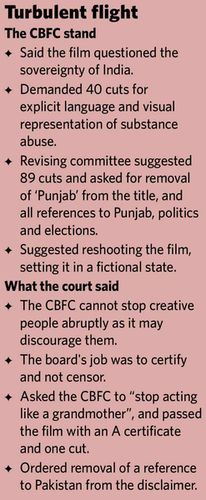Recently, the Central Board of Film Certification suggested the removal of the word 'Punjab' from the title of Abhishek Chaubey’s Udta Punjab, besides demanding many more cuts. The issue snowballed, pitting filmmakers against the board, and became a fight for freedom of expression.
The rampant drug problem is expected to be an important issue in the 2016 Punjab elections. Realising this, the ruling Shiromani Akali Dal-BJP coalition objected to the film’s content, turning it into a political issue. Seeing an opportunity, the Congress and the Aam Aadmi Party criticised the government for its laxity in curbing the menace.
On May 26, the CBFC demanded 40 cuts to the film for explicit language and visual representation of substance abuse. The producers—Phantom Films and Balaji Motion Pictures—approached the board for an A certificate for the film, which highlights the issue of drug abuse, especially in Punjab. A revising committee of the CBFC then demanded 89 cuts and asked the makers to remove ‘Punjab’ from the title. Moreover, the committee demanded the removal of all references to Punjab, politics and elections. There were suggestions to reshoot the film, setting it in a fictional state.

The producers planned to approach the Film Certification Appellate Tribunal. But, by the time they got a written directive from the CBFC, Justice (retd) S.K. Mahajan, who heads the tribunal, had gone on leave till June 16.
The producers approached the Bombay High Court which, on June 13, asked the CBFC to “stop acting like a grandmother”, and passed the film with an A certificate and one cut—a scene where the lead character, Tommy Singh (Shahid Kapoor), urinates in public. The court also ordered the removal of a reference to Pakistan from the disclaimer.
THE LANDMARK JUDGMENT could change the way films are certified. “The CBFC cannot stop creative people abruptly as it may discourage them,” the judges said. “This will kill creativity. These days filmmakers are brutal, direct and straightforward. One need not treat them harshly just because of this.”
Said director-producer Anurag Kashyap: “We have got films like Gangs of Wasseypur and Dev.D passed under the same guidelines. There have been problems at times, like during Black Friday, but then we fought with reasons. This time, we didn’t have anything in writing to fight. It was more of a power game.”
The ruling has resonated with the entire film industry. Said Chaubey: “From a neutral point of view, what we need to learn is that, as filmmakers, we have the freedom to express ourselves, but we need to be responsible as well. It is a very nice, balanced verdict.”

However, on June 15, a Punjab-based NGO approached the Supreme Court to halt the screening of the film, saying it portrayed Punjab in a bad light. Moreover, the victory in the High Court does not solve the bigger issue. Several other films are still battling it out with the CBFC. The board's examining committee has refused to pass debutant Shlok Sharma's Haraamkhor, which stars Nawazuddin Siddiqui and Shweta Tripathi, and tells the tale of an illicit relationship between a 14-year-old girl and her tuition teacher in a small town in Gujarat. Apparently, the CBFC has also recommended 100 cuts to a Gujarati film about reservation, Salagto Sawaal Anamat (The Burning Question of Reservation).
The CBFC needs a major “overhaul”, said Kashyap. In January, the information and broadcasting ministry constituted a committee under filmmaker Shyam Benegal to revamp the CBFC. The committee, including Kamal Haasan and Rakeysh Omprakash Mehra, is preparing a report that would suggest amendments to the Cinematograph Act of 1952, under which the films are still certified. A former CBFC member, on condition of anonymity, said: “Passed in 1952, the act was revised in 1984. It has been a long time. Life around us has changed and so the laws should evolve. It is disappointing that even after repeated attempts from board members to modify the act, successive governments have not taken any step in the direction.”
Kashyap, however, said there was some hope as Information and Broadcasting Minister Arun Jaitley and his junior minister Rajyavardhan Singh Rathore have shown interest and are ready to take up the cause. “Usually, what happened was that the issue became political and lost focus,” said Kashyap. “This time, it remained singular and sent across the right message that the industry can come together for a bigger change.”
The problem, however, is more deep-rooted than it seems. Filmmaker and CBFC board member Ashoke Pandit said that, after Pahlaj Nihalani’s appointment as the chairman of the board in January 2015, everyone and everything else seemed to have become redundant. Pandit said he was disappointed with the controversy, and that the monthly meetings of the board members were not happening regularly. The last meeting was almost four months ago. “We have been requesting a board meeting for long, but it is not happening,” said Pandit. He said bringing in a filmmaker (Nihalani) as chairman was a welcome change, “but even that is not working”.
The multiplexes, which usually adhere to CBFC directives, also came out in support of Udta Punjab. Said Rajesh Makhija, associate vice president, sales and marketing, Carnival Cinemas: “The issue raised in the film is being linked to the elections for no reason. It is a creative call and politics should not come in between.”
The former CBFC member said the best way was to work within the system and try to reform it. “The board members should sit across the table with the Shyam Benegal committee and work out issues with the ministry,” said the former CBFC member. “The decision on the suggestion to have more categories than the present three—U, U/A and A—should also be addressed soon. This is one reason that upsets filmmakers most of the time. Once things fall into place in a spirit of bonhomie and cooperation, the industry will have a better guideline to work.”






